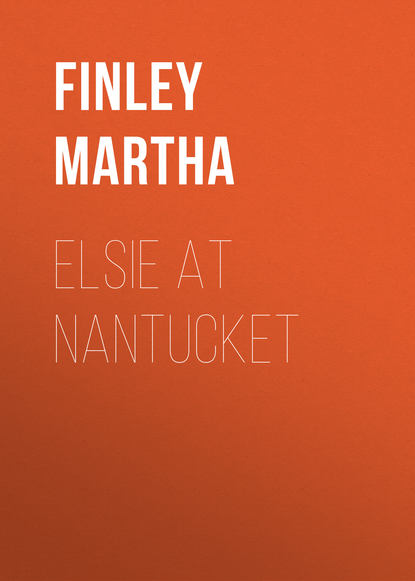По всем вопросам обращайтесь на: info@litportal.ru
(©) 2003-2024.
✖
Elsie at Nantucket
Настройки чтения
Размер шрифта
Высота строк
Поля
They pressed onward and presently came upon a lovely lakelet near the beach, as clear as crystal and with bushes with dark green foliage growing on all sides but that toward the sea.
They stopped for a moment to gaze upon it with surprise and admiration, then pushed on again till the top of the high bluff known as Tom Never's Head was reached.
They stood upon its brink and looked off westward and northward over the heaving, tumbling ocean, as far as the eye could reach to the line where sea and sky seemed to meet, taking in long draughts of the pure, invigorating air, and listening to the roar of the breakers below.
"What is that down there?" asked Lulu.
"Part of a wreck, evidently," answered her father; "it must have been there a long while, it is so deeply imbedded in the sand."
"I wish I knew its story," said Lulu; "I hope everybody wasn't drowned when it was lost."
"It must have happened years ago, before that life-saving station was built," remarked Max.
"Life-saving station," repeated Lulu, turning to look in the direction of his glance; "what's that?"
"Do you not know what that means?" asked her father. "It is high time you did. Those small houses are built here and there all along our coast by the general government, for the purpose of accommodating each a band of surf-men, who are employed by the government to keep a lookout for vessels in distress, and give them all the aid in their power.
"They are provided with lifeboats, buoys, and other necessary things to enable them to do so successfully. If it were not too near breakfast time I should take you over there to see their apparatus; but we must defer it to some other day, which will be quite as well, for then we may bring a larger party with us. Now for home," he added, again taking Lulu's hand; "if your appetites are as keen as mine you will be glad to get there and to the table."
"Two good hours to bathing-time," remarked Mr. Dinsmore, consulting his watch as they rose from the breakfast table. "I propose that we utilize them in a visit to Sankaty lighthouse."
All were well satisfied to do so, and presently they set off, some driving, others walking, for the distance is not great, and even feeble folk often find themselves able to take quite long tramps in the bracing sea air.
Max and Lulu preferred to walk when they learned that their father intended doing so; then Grace, though extremely fond of driving, begged leave to join their party, and the captain finally granted her request, thinking within himself that he could carry her if her strength gave out.
The little face grew radiant with delight.
"Oh, you are a nice, good papa!" she cried, giving him a hug and kiss, for he was seated with her upon his knee.
"I am glad you think so," he said, laughingly, as he returned her caress. "Well, as soon as I have helped your mamma into the carriage we will start."
They set out presently, Grace holding fast to one of his hands while Lulu had the other, and tripping gayly along by his side till, passing out of the village, they struck into the narrow path leading to Sankaty; then the little maid moved along more soberly, looking far away over the rolling billows and watching the progress of some vessels in the offing.
They could hear the dash of the waves on the beach below, but could not see it for the over-hanging cliffs, the path running some yards distant from their brink.
"I want to see where the waves come up," said Lulu; "there's Max looking down over the edge; can't we go and look too, papa?"
"Yes, with me along to take care of you," he said, turning from the path and leading them seaward; "but don't venture alone, the ground might crumble under your feet and you would have a terrible fall, going down many feet right into the sea."
They had reached the brink. Grace, clinging tightly to her father's hand, took one timid peep, then drew back in terror. "Oh, papa, how far down it is!" she exclaimed. "Oh, let's get away, for fear the ground will break and let us fall."
"Pooh! Gracie, don't be such a coward," said Lulu. "I shouldn't be afraid even if papa hadn't hold of our hands."
"I should be afraid for you, Lulu, so venturesome as you are," said the captain, drawing her a little farther back. "Max, my son, be careful."
"Yes, sir, I will. Papa, do you know how high this bluff is?"
"They say the bank is eighty-five feet high where the lighthouse stands, and I presume it is about the same here. Now, children, we will walk on."
Grace's strength held out wonderfully; she insisted she was not at all tired, even when the end of their walk was reached.
The other division of the party had arrived some minutes before, and several were already making the ascent to the top of the lighthouse tower; the rest were scattered, waiting their turn in the neat parlor of the keeper's snug little home, or wandering over the grassy expanse between it and the sea.
"There are Grandma Elsie and mamma in the house," cried Grace, catching sight of them through a window.
"Yes," said her father, "we will go in there and wait our turn with them," leading the way as he spoke. "Do you want to go up into the tower, Gracie?"
"Oh no, no, papa!" she cried, "what would be the use? and I am afraid I might fall."
"What, with your big strong father to hold you fast?" he asked laughingly, sitting down and drawing her to a seat upon his knee; for they had entered the parlor.
"It might tire you to hold me so hard; I'm getting so big now," she answered naïvely, looking up into his face with a loving smile and stealing an arm about his neck.
"Ah, no danger of that," he laughed. "Why, I believe I could hold even your mamma or Lulu, and that against their will, without being greatly exhausted by the exertion.
"My dear," turning to Violet, "shall I have the pleasure of helping you up to the top of the tower?"
"Thank you, I think I shall not try it to-day," she answered; "they tell me the steps are very steep and hard to climb."
"Ah, so I suppose, and I think you are wise not to attempt it."
"But I may, mayn't I, papa?" Lulu said. "You know I always like to go everywhere."
"I fear it will be a hard climb for a girl of your size," he answered doubtfully.
"Oh, but I want to go, and I don't care if it is a hard climb," she said coaxingly, coming close to his side and laying her hand on his shoulder. "Please, papa, do say I may."
"Yes, since you are so desirous," he said, in an indulgent tone.
Max came hurrying in. "We can go up now, papa," he said; "the others have come down."
Edward and Zoe were just behind the boy. "Oh, you ought all to go up," cried the latter; "the view's just splendid."
"Mother," said Edward, "the view is very fine, but there are sixty steps, each a foot high; a pretty hard climb for a lady, I should think. Will you go up? may I have the pleasure of helping you?"
"Yes," she answered; "I am quite strong and well, and think the view will probably pay for the exertion."
They took the lead, the captain following with Lulu, and Max bringing up the rear.
Having reached the top and viewed the great light (one of the finest on the coast) from the interior, Elsie stepped outside, and holding fast to Edward's hand made the entire circuit, enjoying the extended view on all sides.
Stepping in again, she drew a long breath of relief. "I should not like to try that in a strong wind," she said, "or at all if I were easily made dizzy; no, nor in any case without a strong arm to cling to for safety; for there is plenty of space to fall through between the iron railing and the masonry."
"I should tremble to see you try it alone, mother," Edward said.
"It is a trifle dangerous," acknowledged the keeper.
"Yet safe enough for a sailor," laughed the captain, stepping out.











